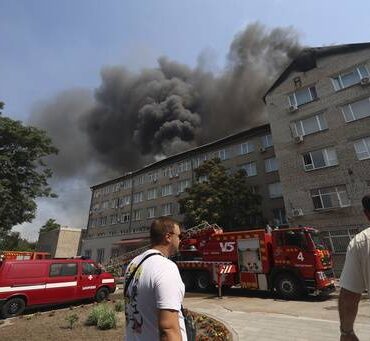Russian sabotage push escalating in Europe

LONDON—It was almost midnight when a truck driver resting in his cab heard the crackling of flames at a warehouse in east London storing equipment for Ukraine. He grabbed a fire extinguisher and leapt out—but realized the blaze was too big and retreated.
When police arrived, they banged on the doors of a nearby apartment building, shouting at residents to evacuate. Parents grabbed children and ran into the street.
About 30 minutes after the fire started, Dylan Earl, a British man who admitted to organizing the arson, received a message from a man UK authorities say was his Russian handler.
“Excellent,” it read in Russian.
On Tuesday, a British court found three men guilty of arson in the March 2024 plot that prosecutors said was masterminded by Russia’s intelligence services—part of a campaign of disruption across Europe that Western officials blame on Moscow and its proxies. Two other men, including Earl, previously pleaded guilty to organizing the arson.
Getting more violent
The fire is one of more than 70 incidents linked to Russia that The Associated Press (AP) has documented since Moscow’s invasion of Ukraine in February 2022.
Four European intelligence officials told AP they’re worried the risk of serious injury or even death is rising as untrained saboteurs set fires near homes and businesses, plant explosives or build bombs. AP’s tracking shows 12 incidents of arson or serious sabotage last year compared with two in 2023 and none in 2022.
“When you start a campaign, it creates its own dynamic and gets more and more violent over time,” said one of the officials, who holds a senior position at a European intelligence agency. The official, like two others, spoke on condition of anonymity to discuss security matters.
The Kremlin did not reply to a request for comment on the British case. Spokesperson Dmitry Peskov previously said the Kremlin has never been shown “any proofs” supporting accusations Russia is running a sabotage campaign and said “certainly we definitely reject any allegations.”
Recruiting young amateurs
Most of the saboteurs accused of working on behalf of Russia are foreign, including Ukrainians. They include young people with no criminal records who are frequently hired for a few thousand dollars, the intelligence officials said.
The senior official said Russia has been forced to rely increasingly on such amateurs since hundreds of Moscow’s spies were expelled from Western countries following an operation to poison former Russian intelligence officer Sergey Skripal in the UK in 2018. That led to the death of a British woman—and a major response from the West.
Russia “had to change the modus operandi, from using cadre officers to using proxies, making a more flexible, deniable system,” the official said.
Documents shared during the London warehouse trial offered a rare glimpse into how young men are recruited.
Among those were transcripts of messages between a man prosecutors said was a Russian intelligence operative and his recruit, Earl.

















